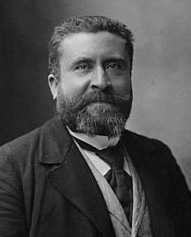| Profile | Major Works | Resources |
Jean Jaurès, 1859-1914.

Reformist French socialist leader, supporter of the Marxist revisionist, Eduard Bernstein.
A former teacher, Jean Jaurès started out as a republican when first elected to the French chamber of deputies in 1885. In the 1890s, Jean Jaurès gravitated left, and cut a notable public figure as an independent socialist and theorist of social democracy. He stressed the humanitarian aspects of Marxian socialism and its compatibility with French republican values. One of the first to draw attention to the Socialist Calculation problem.
Jean Jaurès was a founder of the reformist French Socialist Party (Parti socialiste français, PSF) in 1902, which merged various older gradualist parties, in contradistinction with the revolutionary Socialist Party of France (Parti socialiste de France, PSdF) led by Marxists Jules Guesde, Paul Lafargue and Blanquist Édouard Vaillant. The two socialist parties would merge in 1905 to form a single large French socialist party, the Section Française de l'Internationale Ouvrière (SFIO). Jaurès assumed a leading role in the SFIO.
For his opposition to militarism and war, Jean Jaurès was assassinated in a Parisian cafe by a nationalist on the eve of World War I.
|
Major Works of Jean Jaurès
|
|
HET
|
|
Resources on Jean Jaurès
|
All rights reserved, Gonçalo L. Fonseca
